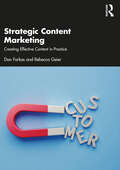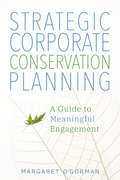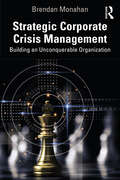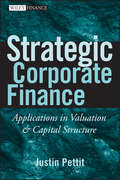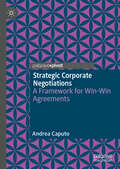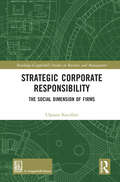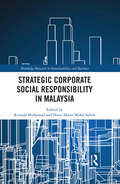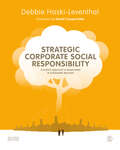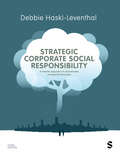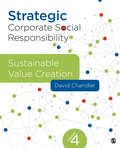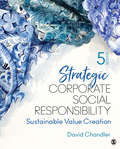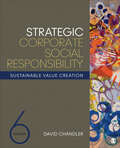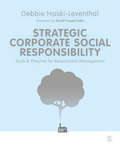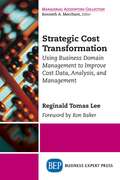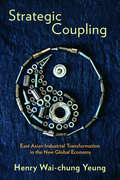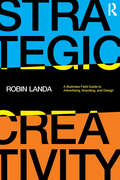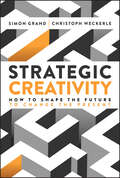- Table View
- List View
Strategic Considerations for First-Time Sovereign Bond Issuers
by Michael Papaioannou Magdalena Polan Udaibir S. DasA report from the International Monetary Fund.
Strategic Content Marketing: Creating Effective Content in Practice
by Dan Farkas Rebecca GeierStrategic Content Marketing offers a comprehensive guide to planning, creating, implementing and analyzing an effective content marketing strategy in practice. Each chapter marries established theory with modern practice, illustrating concepts with real-world case studies and examples alongside interviews with prominent content marketers, including a foreword by Joe Pulizzi, founder of The Content Marketing Institute and often referred to as the Father of Content Marketing. Chapter objectives and summaries structure learning, while reflective questions and activities aid comprehension. On reading, students will understand: The definition, purpose, and practical implementation of a content marketing programme The relationship between content marketing and broader marketing, strategic positioning, buyer personas, and research initiatives The most effective and valued forms of content marketing and how they are structured and used, including a special focus on digital and B2B content marketing How to create persuasive content and measure the effectiveness of content marketing The careers, associated competencies, and software technologies in the burgeoning field of content marketing. This comprehensive text is perfect core and recommended reading for advanced undergraduate and postgraduate students studying content marketing, inbound marketing, marketing communications, digital and social media marketing, and public relations. In practice, the book is also highly valuable for practicing professionals studying for professional qualifications and looking to develop their skills. Online resources include instructor teaching slides, four-color images and templates, and chapter test bank questions.
Strategic Conversations
by J. C. Spender Bruce A. StrongMost organizations fail to take full advantage of their employees' knowledge, initiative, and imagination. In this accessible and practical book, J. -C. Spender and Bruce Strong provide a guide for building entrepreneurial workforces through carefully designed conversations between management and employees. These 'strategic conversations' make employees partners in the strategy development process, engaging them to help shape the organization's future. The result is transformational: instead of strategy being a dry, periodic planning exercise for the few, it becomes a dynamic and continuous act of co-creation enriched by the many. Case studies illustrate how leading organizations have used strategic conversations to build sustained competitive advantage, create innovative business models, make better decisions under uncertainty, reduce the need for change management, and enhance employee engagement. The book will appeal to managers, entrepreneurs of all stripes, and teachers and students in schools of business and public administration.
Strategic Corporate Conservation Planning: A Guide to Meaningful Engagement
by Margaret O'GormanIndustries that drive economic growth and support our comfortable modern lifestyles have exploited natural resources to do so. But now there's growing understanding that business can benefit from a better relationship with the environment. Leading corporations have begun to leverage nature-based remediation, restoration, and enhanced lands management to meet a variety of business needs, such as increasing employee engagement and establishing key performance indicators for reporting and disclosures. Strategic Corporate Conservation Planning offers fresh insights for corporations and environmental groups looking to create mutually beneficial partnerships that use conservation action to address business challenges and realize meaningful environmental outcomes. Myriad case studies featuring programs from habitat restoration to environmental educational initiatives at companies like Bridgestone USA, General Motors, and CRH Americas are included to help spark new ideas.
Strategic Corporate Crisis Management: Building an Unconquerable Organization
by Brendan MonahanPresenting an alternative to traditional models of centralized crisis management, this book makes the case for decentralizing crisis response and building resilience where it matters most, and provides an accessible, pragmatic approach for doing so. Focusing squarely on crisis management, the book challenges the notion that corporate crisis teams can be expected to swoop in and “save the day”: the role of the crisis team should be to advance a culture of readiness across an organization, and to foster leadership and crisis competency where it’s needed, when it’s needed. Crisis management expert Brendan Monahan draws from current management and leadership thinking that challenges hierarchies, finds incredible potential in the power of an organization’s people, and aligns with many of today’s highest-performing organizations that have already adopted this approach. This may run counter to current crisis management texts prescribing highly disciplined planning and command structures, but following this book’s alternative approach will unlock tremendous potential, deepen resilience, and improve outcomes in crisis response. Professionals in crisis management, business continuity, emergency management, risk management, and others with crisis management accountability will value this practical book for “corporate crisis first responders” to use when they encounter the extraordinary.
Strategic Corporate Finance
by Justin PettitEssential guidance for the corporate finance professional -- advisor, Board Director, CFO, Treasurer, business development executive, or M&A expert--to ask the right questions and make the critical decisions. Strategic Corporate Finance is a practical guide to the key issues, their context, and their solutions. From performance measurement and capital planning to risk management and capital structure, Strategic Corporate Finance, translates principles of corporate finance theory into practical methods for implementing them. Filled with in-depth insights, expert advice, and detailed case studies, Strategic Corporate Finance will prepare you for the issues involved in raising, allocating and managing capital, and its associated risks.Justin Pettit (New York, NY) draws on his 15 years of senior advisory experience as an investment banker and management consultant. He advises corporate boards and executives on matters of capital structure, financial policy, valuation, and strategy. He also lectures on topics in advanced corporate finance to graduate and undergraduate students at universities in the New York area.
Strategic Corporate Negotiations: A Framework for Win-Win Agreements
by Andrea CaputoExploring the concept of win-win agreements, this book analyses how they pose an important challenge for entrepreneurs, managers and advisors involved in complex negotiations among firms. Providing an overview and discussion of existing literature, the author further develops a theoretical framework for analysing corporate negotiations, and illustrates how this can be implemented in real-life situations. This book presents an empirical case study from the automotive industry and analyses the negotiation between Fiat Chrysler in 2009, offering practical strategies for those involved in corporate negotiations. Presenting how win-win agreements can improve competitive advantage, this book will be an invaluable read for practitioners and scholars alike.
Strategic Corporate Responsibility: The Social Dimension of Firms (Routledge-Giappichelli Studies in Business and Management)
by Ulpiana KocollariIn her book, Dr Ulpiana Kocollari presents a unique contribution to the debate on Corporate Social Responsibility and Sustainability by clearly expressing how the configuration of a firm’s social dimension can help identify inclusive corporate governance models, define innovative management processes and reshape performance measurement systems for the evaluation and assessment of sustainable economic, social and environmental results. Moving a step further, a firm’s social dimension is defined within the configuration of stakeholders – resources – rewards patterns intrinsic to their interactions with their environment and embedded in their business activities. Based on this approach, a framework is provided to guide firms in identifying management activities grounded in and suited to their prevalent patterns, in order to support current and future strategies and establish adequate measurement and communication tools for pursuing their mission. The book contains original theoretical and empirical material and particular attention is paid to the principal social and environmental impact measurement models (i.e. Global Reporting Initiative, Social Return on Investments, Social Balanced Scorecard, etc.), analysing their main features in order to pinpoint their adequacy in assessing the social dimension and to tailor their use more closely to the specific patterns to which they refer. Finally, a detailed application of the analysis framework, which the author has identified is proposed for Innovative Start-Ups with a Social Goal and for Benefit Corporations, in order to detect the patterns embedded in their social dimension and their distinctive traits, which influence their management and measurement processes.
Strategic Corporate Social Responsibility in Malaysia (Routledge Research in Sustainability and Business)
by Rusnah Muhamad Noor Akma Mohd SallehTo fully comprehend corporate social responsibility (CSR), corporations must understand the many-sided nature of CSR. This book provides insight into the theoretical foundation, beliefs, and expectations of the multiple stakeholders; the governance of CSR commitment; and corporations’ strategies associated with the design, development, implementation and communication strategies for CSR through the case study on Malaysia. The book also explains why corporations should pursue a dual economic and social function and why it being critical to an organisation’s success. It also describes the CSR trends and influences such as sustainability and globalisation on the future of CSR.
Strategic Corporate Social Responsibility: A Holistic Approach to Responsible and Sustainable Business
by Debbie Haski-LeventhalWith the changing expectations of consumers, employees and regulators, being best in the world is no longer enough. Businesses are now also expected to be best for the world: to be socially and environmentally responsible, sustainable and ethical. Based on the idea that strategic CSR offers the most holistic and effective approach to corporate social responsibility, the author presents the key concepts, theories and philosophical approaches to CSR, along with the practical tools needed to implement this knowledge in the real world. The book is split into three parts; the first part provides the theoretical background of CSR, the second part examines various CSR approaches and how they can be implemented, and the third part discusses measuring and communicating CSR. New this edition is also a chapter titled ‘The S in CSR: Social and Global Issues’. Each chapter contains questions for reflection & discussion, exercises, and case studies from globally recognised brands such as Ben & Jerry′s, Google, H&M, Johnson & Johnson, Nestlé, Patagonia, Puma, Unilever and Whole Foods. The book is complemented by chapter specific lecturer PowerPoint slides, a draft syllabus and an instructor′s manual. Suitable reading for students on Corporate Social Responsibility modules.
Strategic Corporate Social Responsibility: A Holistic Approach to Responsible and Sustainable Business
by Debbie Haski-LeventhalWith the changing expectations of consumers, employees and regulators, being best in the world is no longer enough. Businesses are now also expected to be best for the world: to be socially and environmentally responsible, sustainable and ethical. Based on the idea that strategic CSR offers the most holistic and effective approach to corporate social responsibility, the author presents the key concepts, theories and philosophical approaches to CSR, along with the practical tools needed to implement this knowledge in the real world. The book is split into three parts; the first part provides the theoretical background of CSR, the second part examines various CSR approaches and how they can be implemented, and the third part discusses measuring and communicating CSR. New this edition is also a chapter titled ‘The S in CSR: Social and Global Issues’. Each chapter contains questions for reflection & discussion, exercises, and case studies from globally recognised brands such as Ben & Jerry′s, Google, H&M, Johnson & Johnson, Nestlé, Patagonia, Puma, Unilever and Whole Foods. The book is complemented by chapter specific lecturer PowerPoint slides, a draft syllabus and an instructor′s manual. Suitable reading for students on Corporate Social Responsibility modules.
Strategic Corporate Social Responsibility: A Holistic Approach to Sustainable and Impactful Business
by Debbie Haski-LeventhalIn today′s world, being the best in the world is no longer enough. Businesses are now expected to be the best for the world: socially and environmentally responsible, sustainable, and ethical. This updated edition of Strategic Corporate Social Responsibility offers a comprehensive approach to CSR, presenting key concepts, theories, and practical tools for real-world application. The book is divided into three parts: theoretical background, CSR approaches and implementation, and measuring and communicating CSR. New to this edition is a chapter on social and global issues, along with three new case studies from Africa, Asia, and Latin America. The content has been extensively revised, adding summary questions at the end of each chapter and highlighting cutting-edge technology, including AI, machine learning, virtual reality, and blockchain. Featuring case studies from globally recognized brands like Ben & Jerry′s, Google, H&M, and Unilever, this book is an essential resource for students on Corporate Social Responsibility modules. Debbie Haski-Leventhal is Professor of Management at Macquarie Business School and an expert on corporate social responsibility (CSR), responsible management education (RME) and volunteerism. Detailed updates for the 3rd edition: Nearly half the book is rewritten. The book is restructured for a better flow, as are many of its chapters. It now has many new images and figures too New cases from outside the US, such as Fairphone (The Netherlands), Sony (Japan), and Lush (The UK) and many new mini cases from around the globe, including Egypt, Bangladesh, and China A new and more holistic definition of Strategic CSR, with six original components An emphasis on how cutting-edge technologies, such as AI, machine learning, virtual reality and blockchains, can serve responsible and sustainable business Each chapter now ends with summary questions that be used in class or for assessment A new and powerful Foreword by Professor David Cooperrider, a CSR leader and the father of appreciative inquiry, and several new endorsements Additional exercises and questions for interactive learning together with revised online materials, such as a teaching gu
Strategic Corporate Social Responsibility: A Holistic Approach to Sustainable and Impactful Business
by Debbie Haski-LeventhalIn today′s world, being the best in the world is no longer enough. Businesses are now expected to be the best for the world: socially and environmentally responsible, sustainable, and ethical. This updated edition of Strategic Corporate Social Responsibility offers a comprehensive approach to CSR, presenting key concepts, theories, and practical tools for real-world application. The book is divided into three parts: theoretical background, CSR approaches and implementation, and measuring and communicating CSR. New to this edition is a chapter on social and global issues, along with three new case studies from Africa, Asia, and Latin America. The content has been extensively revised, adding summary questions at the end of each chapter and highlighting cutting-edge technology, including AI, machine learning, virtual reality, and blockchain. Featuring case studies from globally recognized brands like Ben & Jerry′s, Google, H&M, and Unilever, this book is an essential resource for students on Corporate Social Responsibility modules. Debbie Haski-Leventhal is Professor of Management at Macquarie Business School and an expert on corporate social responsibility (CSR), responsible management education (RME) and volunteerism. Detailed updates for the 3rd edition: Nearly half the book is rewritten. The book is restructured for a better flow, as are many of its chapters. It now has many new images and figures too New cases from outside the US, such as Fairphone (The Netherlands), Sony (Japan), and Lush (The UK) and many new mini cases from around the globe, including Egypt, Bangladesh, and China A new and more holistic definition of Strategic CSR, with six original components An emphasis on how cutting-edge technologies, such as AI, machine learning, virtual reality and blockchains, can serve responsible and sustainable business Each chapter now ends with summary questions that be used in class or for assessment A new and powerful Foreword by Professor David Cooperrider, a CSR leader and the father of appreciative inquiry, and several new endorsements Additional exercises and questions for interactive learning together with revised online materials, such as a teaching gu
Strategic Corporate Social Responsibility: Sustainable Value Creation
by David ChandlerStrategic Corporate Social Responsibility: Sustainable Value Creation redefines corporate social responsibility (CSR) as being central to the value-creating purpose of the firm. Based on a theory of empowered stakeholders, this bestselling text argues that the ‘responsibility’ of a corporation is to create value, broadly defined. In this new Fourth Edition, author David Chandler explores why some firms are better at CSR and how other firms can improve their CSR efforts. Keep your course content up-to-date! Subscribe to David Chandler's 'CSR Newsletters' by e-mailing him at david.chandler@ucdenver.edu. The newsletters are designed to be a dynamic complement to the text that can be used for in-class discussion and debate. Past newsletters are archived as a freely-available resource for instructors and students at: http://strategiccsr-sage.blogspot.com/
Strategic Corporate Social Responsibility: Sustainable Value Creation
by David ChandlerStrategic Corporate Social Responsibility: Sustainable Value Creation redefines corporate social responsibility (CSR) as being central to the value-creating purpose of the firm. Based on a theory of empowered stakeholders, this bestselling text argues that the ‘responsibility’ of a corporation is to create value, broadly defined. In this new Fourth Edition, author David Chandler explores why some firms are better at CSR and how other firms can improve their CSR efforts. Keep your course content up-to-date! Subscribe to David Chandler's 'CSR Newsletters' by e-mailing him at david.chandler@ucdenver.edu. The newsletters are designed to be a dynamic complement to the text that can be used for in-class discussion and debate. Past newsletters are archived as a freely-available resource for instructors and students at: http://strategiccsr-sage.blogspot.com/
Strategic Corporate Social Responsibility: Sustainable Value Creation
by David ChandlerA holistic perspective for navigating and exploring the CSR landscape. Strategic Corporate Social Responsibility: Sustainable Value Creation, Fifth Edition, redefines corporate social responsibility (CSR) as being central to the value-creating purpose of the firm and provides a framework that firms can use to navigate the complex and dynamic business landscape. Based on a theory of empowered stakeholders, this bestselling text argues that the responsibility of a corporation is to create value, broadly defined. The primary challenge for managers today is to balance the competing interests of the firm’s stakeholders, understanding that what they expect today may not be what they will expect tomorrow. This tension is what makes CSR so complex and demanding, but it is also what makes CSR integral to the firm’s strategy and day-to-day operations. The new edition includes the latest research, new cases, a streamlined table of contents, and expanded emphasis on the legal perspective of strategic CSR. Keep your course content up-to-date! Subscribe to David Chandler's 'CSR Newsletters' by e-mailing him at david.chandler@ucdenver.edu. The newsletters are designed to be a dynamic complement to the text that can be used for in-class discussion and debate. Past newsletters are archived as a freely-available resource for instructors and students at: http://strategiccsr-sage.blogspot.com/
Strategic Corporate Social Responsibility: Sustainable Value Creation
by David ChandlerA holistic perspective for navigating and exploring the CSR landscape. Strategic Corporate Social Responsibility: Sustainable Value Creation, Fifth Edition, redefines corporate social responsibility (CSR) as being central to the value-creating purpose of the firm and provides a framework that firms can use to navigate the complex and dynamic business landscape. Based on a theory of empowered stakeholders, this bestselling text argues that the responsibility of a corporation is to create value, broadly defined. The primary challenge for managers today is to balance the competing interests of the firm’s stakeholders, understanding that what they expect today may not be what they will expect tomorrow. This tension is what makes CSR so complex and demanding, but it is also what makes CSR integral to the firm’s strategy and day-to-day operations. The new edition includes the latest research, new cases, a streamlined table of contents, and expanded emphasis on the legal perspective of strategic CSR. Keep your course content up-to-date! Subscribe to David Chandler's 'CSR Newsletters' by e-mailing him at david.chandler@ucdenver.edu. The newsletters are designed to be a dynamic complement to the text that can be used for in-class discussion and debate. Past newsletters are archived as a freely-available resource for instructors and students at: http://strategiccsr-sage.blogspot.com/
Strategic Corporate Social Responsibility: Sustainable Value Creation
by David ChandlerStrategic Corporate Social Responsibility: Sustainable Value Creation (Sixth Edition) redefines corporate social responsibility (CSR) as being central to the value-creating purpose of the firm. Based on a theory of empowered stakeholders, this bestselling text argues that the responsibility of a corporation is to create value, broadly defined. The primary challenge for managers today is to balance the competing interests of the firm’s stakeholders’ understanding that what they expect today may not be what they will expect tomorrow. This tension is what makes CSR so complex and demanding, but it is also what makes CSR integral to the firm’s strategy and day-to-day operations. In this new Sixth Edition, author David Chandler explores issues around COVID-19, the BLM movement, the supply chain crunch, and the "great resignation."
Strategic Corporate Social Responsibility: Sustainable Value Creation
by David ChandlerStrategic Corporate Social Responsibility: Sustainable Value Creation (Sixth Edition) redefines corporate social responsibility (CSR) as being central to the value-creating purpose of the firm. Based on a theory of empowered stakeholders, this bestselling text argues that the responsibility of a corporation is to create value, broadly defined. The primary challenge for managers today is to balance the competing interests of the firm’s stakeholders’ understanding that what they expect today may not be what they will expect tomorrow. This tension is what makes CSR so complex and demanding, but it is also what makes CSR integral to the firm’s strategy and day-to-day operations. In this new Sixth Edition, author David Chandler explores issues around COVID-19, the BLM movement, the supply chain crunch, and the "great resignation."
Strategic Corporate Social Responsibility: Tools and Theories for Responsible Management
by Dr Debbie Haski-LeventhalWith the changing expectations of consumers, employees and regulators, being best in the world is no longer enough. Businesses are now also expected to be best for the world: to be socially and environmentally responsible, sustainable and ethical. Based on the idea that strategic CSR offers the most holistic and effective approach to corporate social responsibility, the author presents the key concepts, theories and philosophical approaches to CSR, along with the practical tools needed to implement this knowledge in the real world. The book is split into three parts; the first part provides the theoretical background of CSR, the second part examines various CSR approaches and how they can be implemented, and the third part discusses measuring and communicating CSR. Each chapter contains questions for reflection & discussion, exercises, and case studies from globally recognised brands such as Ben & Jerry’s, Nestle, Marks & Spencer, TOMS Shoes, LEGO, Coca-Cola and McDonald’s. The book is complemented by chapter specific lecturer PowerPoint slides, which can be found here. Suitable reading for students on Corporate Social Responsibility modules.
Strategic Corporate Social Responsibility: Tools and Theories for Responsible Management
by Dr Debbie Haski-LeventhalWith the changing expectations of consumers, employees and regulators, being best in the world is no longer enough. Businesses are now also expected to be best for the world: to be socially and environmentally responsible, sustainable and ethical. Based on the idea that strategic CSR offers the most holistic and effective approach to corporate social responsibility, the author presents the key concepts, theories and philosophical approaches to CSR, along with the practical tools needed to implement this knowledge in the real world. The book is split into three parts; the first part provides the theoretical background of CSR, the second part examines various CSR approaches and how they can be implemented, and the third part discusses measuring and communicating CSR. Each chapter contains questions for reflection & discussion, exercises, and case studies from globally recognised brands such as Ben & Jerry’s, Nestle, Marks & Spencer, TOMS Shoes, LEGO, Coca-Cola and McDonald’s. The book is complemented by chapter specific lecturer PowerPoint slides, which can be found here. Suitable reading for students on Corporate Social Responsibility modules.
Strategic Cost Transformation: Using Business Domain Management To Improve Cost Data, Analysis, and Management
by Reginald Tomas LeeStrategic Cost Transformation offers a new framework, business domain management, which creates a comprehensive picture of your organization for improved cash based decision-making. <p><p>Your product costs $2.86 to make. What does the number tell you about your operations, how effectively they were run, demand, or how much money you spent on capacity? Nothing. Shouldn't you know? <p><p> Accounting information creates a limited picture of operations and true cash performance. Strategic Cost Transformation offers a new framework, business domain management, which creates a comprehensive picture of your organization for improved cash based decision-making.
Strategic Coupling: East Asian Industrial Transformation in the New Global Economy (Cornell Studies in Political Economy)
by Henry Wai-chung YeungIn Strategic Coupling, Henry Wai-chung Yeung examines economic development and state-firm relations in East Asia, focusing in particular on South Korea, Taiwan, and Singapore. As a result of the massive changes of the last twenty-five years, new explanations must be found for the economic success and industrial transformation in the region. State-assisted startups and incubator firms in East Asia have become major players in the manufacture of products with a global reach: Taiwan's Hon Hai Precision has assembled more than 500 million iPhones, for instance, and South Korea's Samsung provides the iPhone's semiconductor chips and retina displays. Drawing on extensive interviews with top executives and senior government officials, Yeung argues that since the late 1980s, many East Asian firms have outgrown their home states, and are no longer dependent on state support; as a result the developmental state has lost much of its capacity to steer and direct industrialization. We cannot read the performance of national firms as a direct outcome of state action. Yeung calls for a thorough renovation of the still-dominant view that states are the primary engine of industrial transformation. He stresses action by national firms and traces various global production networks to incorporate both firm-specific activities and the international political economy. He identifies two sets of dynamics in these national-global articulations known as strategic coupling: coevolution in the confluence of state, firm, and global production networks, and the various strategies pursued by East Asian firms to attain competitive positions in the global marketplace.
Strategic Creativity: A Business Field Guide to Advertising, Branding, and Design
by Robin LandaThe secret weapon for business experts to ensure strategically creative results, this is an indispensable field guide to evaluating creative advertising, branding, and design ideas and solutions, and to working with creatives. Strategic Creativity is a fundamental resource that enables business professionals to stand out amongst their colleagues and enhance their ability to communicate the creative "why" throughout their organizations, and it covers what every business expert should fully comprehend about the creative process. To effectively grow a business and reach the right audience or move a brand forward, advertising and branding need to be relevant, engaging, and worth people’s time. This book contains what a CEO, CMO, manager, business owner, or client didn’t learn about the creative side of advertising and design in business school. Featuring insightful conversations with creative experts, this book will earn a place on the desks of executives, leaders, managers, and middle managers across industries, whose work requires them to understand and execute on branding initiatives, advertising campaigns, social media, and other customer-facing content.
Strategic Creativity: How to Shape the Future to Change the Present
by Simon Grand Christoph WeckerleA visionary guide for organizations to harmonize the deep interplay between strategy and creativity Strategic Creativity is the first book to address creativity from a strategic perspective. It discusses, through examples and theoretical reflection, how strategic thinking enables creative solutions—and why it is mistaken to conceptualize creativity and strategy as opposites. It argues that to change the present, we need to learn how to shape the future by embracing uncertainty and openness as an opportunity to create something new. This book invites readers to engage with key questions surrounding how we live our lives, pursue our endeavours, and shape the future, proposing a model that applies to both individual practice and the larger whole. Core topics explored in this book include: The strategic importance of practices in acting creatively and ensuring creative practices succeed by designing strategically Establishing creative enterprises to help organizations move forward, such as by inventing “positive economies” Changing perspectives in curatorial strategies, connecting spheres through entrepreneurial strategies, and bringing worlds together through diplomatic strategies Strategic Creativity earns a well-deserved spot on the bookshelves of artists, designers, researchers, entrepreneurs, and business leaders in creative organizations, political movements, and beyond seeking to act seriously yet playfully, ambitiously yet modestly, and seamlessly merge two dynamic concepts for a clear competitive advantage.

